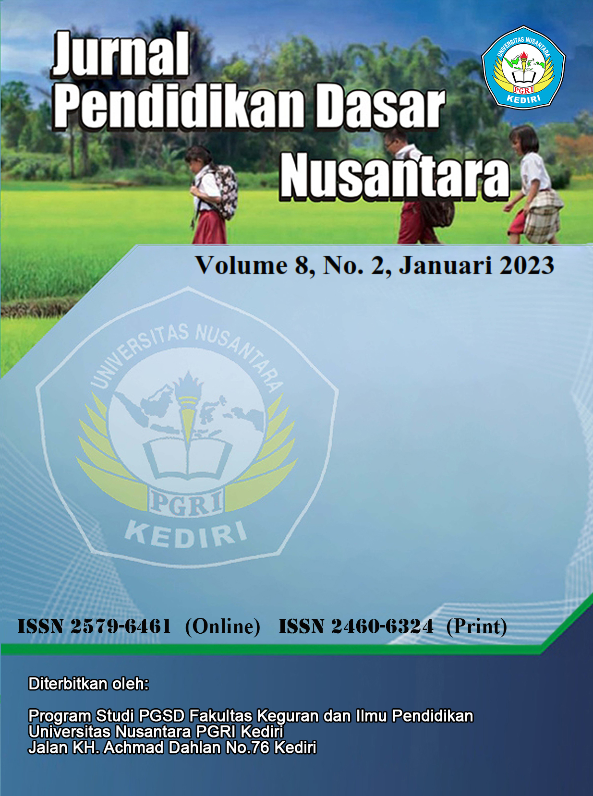Analysis Analysis of mathematical literacy based on mathematical resilience of fifth grade elementary school students
DOI:
https://doi.org/10.29407/jpdn.v8i2.18788Keywords:
mathematical literacy, resilience, elementary schoolAbstract
This study aims to describe the literacy of students in solving mathematical literacy problems based on the level of mathematical resilience. This study used a case study qualitative research method. The research subjects were 20 grade V elementary school students for the 2020/2021 academic year. Data collection techniques using questionnaires, tests, and interviews. Processing the validity of data using technical triangulation techniques. Data analysis techniques using miles and hurry (reducing data, presenting data, drawing conclusions). The results of study showed that students with different levels of mathematical resilience have different mathematical literacy abilities. Students with high mathematical resilience have mathematical literacy skills, which are aspects of formulate, employ and interpret. Students with medium resilience have mathematical literacy skills, which are aspect of formulating problems, while students with low mathematical resilience do not have the three abilities of mathematical literacy.
Downloads
References
Asih, K. S., Isnarto, Sukestiyarno, & Wardono. (2019). Resiliensi Matematis pada Pembelajaran Discovery Learning dalam Upaya Meningkatkan Komunikasi Matematika. Prosiding Seminar Nasional Matematika, 2, 862–868.
Boholono, H. B. (2017). Smart Social Networking: 21st Century Teaching and Learning Skills. Research in Pedagogy, 7(1), 21–29.
Child, S. (2016). Collaboration in the 21st Century: Implication for Assessment. Research Matters, 22, 17–22.
Creswell, J. W. (2013). Qualitative Inquiry & Research Design. SAGE Publication.
Ekawati, R., Susanti, S., & Chen, J.-C. (2020). Primary Students’ Mathematical Literacy: a Case Study. Infinity Journal, 9(1), 49–58. https://doi.org/10.22460/infinity.v9i1.p49-58.
Farman, F., Hali, F., & Rawal, M. (2021). Interest and Resilience in Online Mathematics Learning and Its Impact on Concept Understanding. SAINSMAT: Journal of Applied Sciences, Mathematics, and Its Education, 10(2), 60–67. https://doi.org/10.35877/sainsmat1022222021
Hadiyanti, N. F. D., Hobri, Prihandoko, A. C., Susanto, Murtikusuma, R. P., Khasanah, N., & Maharani, P. (2021). Development of Mathematics E-module with STEM-Collaborative Project Based Learning to Tmprove Mathematical Literacy Ability of Vocational High School Students. Journal of Physics: Conference Series, 1839(1). https://doi.org/10.1088/1742-6596/1839/1/012031
Handun, Habudin, & Rachmiati, W. (2020). The Influence of Using Realistic Mathematics Instruction on. PRIMARY, 12(01), 67–76.
Johnston, W. S., & Lee, C. (2010). Developing Mathematical Resilience. BERA Annual Conference 2010.
Kemendikbud RI. (2016). Peraturan Menteri Pendidikan dan Kebudayaan Nomor 22 Tahun 2016. In Kemendikbud (Vol. 9, Issue). https://www.infodesign.org.br/infodesign/article/view/355%0Ahttp://www.abergo.org.br/revista/index.php/ae/article/view/731%0Ahttp://www.abergo.org.br/revista/index.php/ae/article/view/269%0Ahttp://www.abergo.org.br/revista/index.php/ae/article/view/106
Komala, E. (2017). Mathematical Resilience Mahasiswa pada Mata Kuliah Struktur Aljabar I Menggunakan Pendekatan Explisit Instruction Integrasi Peer Instruction. Mosharafa, 6(3), 357–364.
Mahapoonyanont, N. (2012). The Causal Model of Some Factors Affecting Critical Thinking Abilities. Social and Behavioral Sciences, 46, 146–150. https://doi.org/10.1016/j.sbspro.2012.05.084
Maryani, N., & Widjajanti, D. B. (2020). Mathematical literacy: How to improve it using contextual teaching and learning method? Journal of Physics: Conference Series, 1581(1), 1–7. https://doi.org/10.1088/1742-6596/1581/1/012044
Mehrjerdi, Y. Z., & Lotfi, R. (2019). Development of a mathematical model for sustainable closed-loop supply chain with efficiency and resilience systematic framework. International Journal of Supply and Operations Management, 6(4), 360–388. https://doi.org/10.22034/2019.4.6
Nurfauziah, P., & Fitriani, N. (2019). Gender dan Resiliensi Matematis Siswa SMP dalam Pembelajaran Scientific Berbantuan VBA Excel. Symmetry, 4(1), 28–37.
OECD. (2018). PISA for Development Assessment and Analytical Framework: Reading, Mathematics and Science. OECD Publishing.
Priyonggo, H. W., Wardono, & Asih, T. S. N. (2021). Mathematics Literacy Skill on Problem Based Learning Assisted by E-Module Agito Based on Learning Motivation. Unnes Journal of Mathematics Education Research, 10(1), 2021–2055. http://journal.unnes.ac.id/sju/index.php/ujmer
Putra, M. J. A., Agmadya, T., & Syahrilfuddin, S. (2021). Mathematical Literacy Skills of Fifth Grade Elementary School Students: A Case Study in Pekanbaru. Journal of Teaching and Learning in Elementary Education (Jtlee), 4(1), 39–50. https://doi.org/10.33578/jtlee.v4i1.7842
Rizki, L. M., & Priatna, N. (2019). Mathematical literacy as the 21st century skill. Journal of Physics: Conference Series, 1157(4), 8–13. https://doi.org/10.1088/1742-6596/1157/4/042088
Rokhmah, K. N., Retnawati, H., & Solekhah, P. (2019). Mathematical resilience: Is that affecting the students’ mathematics achievement? Journal of Physics: Conference Series, 1320(1). https://doi.org/10.1088/1742-6596/1320/1/012036
Stacey, K., & Turner, R. (2015). Assessing Mathematical Literacy. In Springer. Springer. https://doi.org/10.1007/978-3-319-10121-7
Sterling, S. (2010). Learning for Resilience, or The Resilient Learner? Towards a Necessary Reconciliation in a Paradigm of Sustainable Education. Environmental Education Research, 16(5), 511–528. https://doi.org/10.1080/13504622.2010.505427
Syafitri, R., Putra, Z. H., & Noviana, E. (2020). Fifth Grade Students’ Logical Thinking in Mathematics. Journal of Teaching and Learning in Elementary Education, 3(2), 157. https://doi.org/10.33578/jtlee.v3i2.7840
Yeager, D. S., & Dweck, C. S. (2012). Mindsets That Promote Resilience : When Students Believe That Personal Characteristics Can Be Developed. Educational Psychologist, 47(4), 302–313. https://doi.org/10.1080/00461520.2012.722805
Yohannes, & Juandi, D. (2021). Analysis of the indicators forming the mathematical resilience of high school students. Journal of Physics: Conference Series, 1806(1). https://doi.org/10.1088/1742-6596/1806/1/012060
Yulia, Kustati, M., & Afriadi, J. (2021). Mathematical Literacy : A Case Study on Padang Students’ Mathematical Ability. Al-Jabar : Jurnal Pendidikan Matematika, 12(1), 109–120. http://ejournal.radenintan.ac.id/index.php/al-jabar/article/view/2014/1564
Zanthy, L. S. (2018). Kontribusi Resiliensi Matematis Terhadap Kemampuan Akademik Mahasiswa Pada Mata Kuliah Statistika Matematika. Mosharafa, 7(1), 85–94.
Downloads
Published
Issue
Section
License
Authors who publish with this journal agree to the following terms:
- Copyright on any article is retained by the author(s).
- The author grants the journal, the right of first publication with the work simultaneously licensed under a Creative Commons Attribution License that allows others to share the work with an acknowledgment of the work’s authorship and initial publication in this journal.
- Authors are able to enter into separate, additional contractual arrangements for the non-exclusive distribution of the journal’s published version of the work (e.g., post it to an institutional repository or publish it in a book), with an acknowledgment of its initial publication in this journal.
- Authors are permitted and encouraged to post their work online (e.g., in institutional repositories or on their website) prior to and during the submission process, as it can lead to productive exchanges, as well as earlier and greater citation of published work.
- The article and any associated published material is distributed under the Creative Commons Attribution-ShareAlike 4.0 International License

































